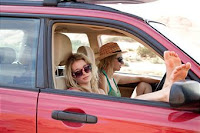
Many trips to Vietnam can leave you wondering what you could find off the beaten track as the tourist route between Ho Chi Minh City and Hanoi is well-trodden. For example, do you know anyone who has been south of Ho Chi Minh City? It’s unlikely as heading north is more popular but that doesn’t mean there isn’t more of the country to explore.
While visitors can join a variety of Vietnam tours you may want to consider car rental and plan a road trip to allow you to see those more unusual locations but there is a lot of be aware of before booking.
Firstly, heed the warnings. Traffic in the big cities is chaotic with few drivers following any specific rules of the road. This can make it dangerous for car drivers, motorbike riders, cyclists and pedestrians, with many serious injuries every day. There are red lights and stop signs in the cities but most will only obey them if a police car is nearby.
Technically the rule is to drive on the right of the road but you will often see drivers on the left side for overtaking, turning or showing impatience for traffic jams.
There are more motorbikes on the road than cars, and they appear from everywhere, making driving either not for those of a nervous disposition. Car horns are honked all day and night and it’s not always clear why. Most Vietnamese ride motorbikes – often one is the main family vehicle – and you will regularly see three generations, and all their shopping, on the same bike.
Driving in Rural Areas
Outside of the cities there can be livestock on the road and the speed limits of 40 to 60 km per hour are not adhered to. The road conditions are poor which can lead to accidents, especially in the monsoon season. Street lights are not common and some vehicles don’t use lights making driving hazardous at night.
Emergency Help
If you have an accident it is generally considered to be the fault of the foreign driver and criminal charges and large compensation claims are common. Public telephones are not common so sort out the use of a mobile phone when on long trips. In theory you can call 113 for police, 114 for the fire services and 115 for an ambulance but it’s not the same service as you would expect in a western country.
International Driving Permits Are Not Valid
You cannot simply arrive at Hanoi or Ho Chi Minh City airport and have car hire waiting for you. International driving permits and your home country driver’s licence are not valid in Vietnam. It is not worth considering driving without the correct licence as you can be prosecuted and/or imprisoned, plus the vehicle will be impounded.
How To Apply For a Vietnamese Registered Driving Licence
You must have a driver’s licence from your home country. A car licence can be used to apply for a Vietnamese car licence but not a motorbike licence. You need to bring a motorbike driving licence from your home country, or take the driving test in Vietnam. You will not have to take the written exam on traffic laws; only your practical riding skills will be assessed.
It can take around two weeks to arrange a licence so allow time. Bureaucracy generally takes longer if you are in a hurry so ensure you have all the relevant paperwork. You must have a valid travel visa for a period of at least three months in Vietnam, irrespective of whether you plan to stay that long.
A registered licence for car driving will be valid for five years or, if less, based on the expiry date on your home country licence, but a motorbike licence has no expiry date.
To start the process you need an application form from the Department of Transport in Ho Chi Minh City (63 Ly Tu Trong Street, Ben Nghe Ward, District 1. Tel: 8.290451-8.237439. Fax 84.8290 458), or Vietnamese Road Administration in Hanoi (tel: 84.83829 0451 or 0452, fax: +84.83829 0458), or contact any office of the Provincial Public Transportation Service of the Vietnamese Department of Communications and Transport.
You then need a notarised duplicate of your original driver’s licence and a notarised duplicate of a Vietnamese-translated copy of your driver’s licence. Do not go to your Embassy or Consulate General as they do not help with these applications unless they specifically say they offer notary services.
Finally you will need three passport sized photos and a small fee (under $5). Take all original documents to the offices listed above, including your original passport and driver’s licence, when submitting your application.
Do remember, Vietnam holidays are meant to be enjoyed so if this all sounds like a hassle then you are right and maybe it should only be considered if you intend to stay for a long time or return regularly.









0 comments:
Post a Comment